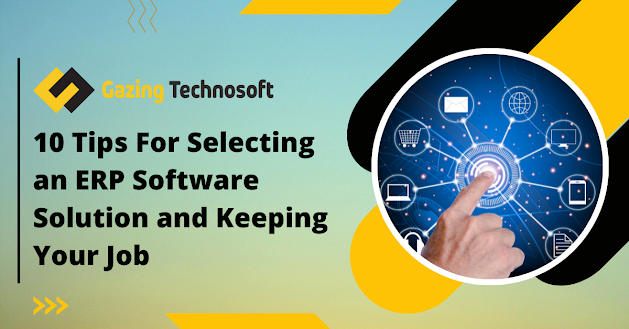10 Tips For Selecting an ERP Software Solution and Keeping Your Job
ERP software selection has evolved into an art form in and of itself. No matter if you're a first-time or experienced buyer of software and services, the job of choosing ERP software is complex and lengthy and can have a significant impact on the performance of your company. When you begin the process, you must ensure that you are careful in your approach to the selection process by establishing a framework and criteria that can lead you on the right path for your company and organization. Hire us for the best custom Software Development like ERP and CRM.
A number of jobs
have ended in the form or the cost of "ERP gone bad" and these tips
can help you develop the right selection plan based on
industry-standard practices and the years of experience of analysts. Each
of the ten suggestions can be utilized as a section of a larger evaluation
framework.
1. Product/Service
The main product's
features, capabilities, and services are offered as part of a total
package. This includes the relevance of the product in the marketplace
when compared to other competitors.
2. Financial viability
Financial and
organizational condition of the company as well as it's capacity to be
competitive and grow in the marketplace. This includes their capacity to
invest in research and development of products.
3. Pricing and execution of sales
The capacity
of a business to demonstrate effectively the benefits capability, capabilities,
and business worth of their product, and to be competitive in price.
4. Customer experience
The customer experience
is the first step to determining the experience of being an end-user of the
company. What is the technical assistance? Are they
available? There's nothing worse than feeling let down following a
purchase. Particularly when it is a huge purchase.
5. Marketing
Understanding is the capacity of
the company to understand the market's (customer) requirements and translate
this into features and product strategies.
6. Vendor's strategy for product development,
with the emphasis on the features, functions, and how it is measured against the
current and future needs.
7. Vertical industry strategy
The company's
ability to align its product vision with the market and industry trends and
needs. The vendor must be a part of and be a part of the industry's user
groups and events.
8. Geographic Strategy
Explains what and how the company will direct the resources available to support various aspects of the business. Find out the ways they can assist you as a client whether it's directly or through an intermediary.
9. Experience
The Company's track record of
delivering solutions that worked that have produced positive results for its
customers. One method of evaluating this is through references from
clients.
10. Business model Rating of the quality of the
business's value proposition that is relevant to the market they serve.
The ten categories above are the most crucial
factors you should consider in the overall decision-making
process. Consider incorporating these "tips to incorporate into your
overall assessment structure and plan. They can provide you with an
excellent basis to choose the most appropriate ERP solution for your
needs. The outcome will likely be the choice of an ERP solution
that will meet your requirements and will help you in building a
high-performance company that makes use of technology to assist decisions and
accelerates growth.
.png)

.png)

Comments
Post a Comment